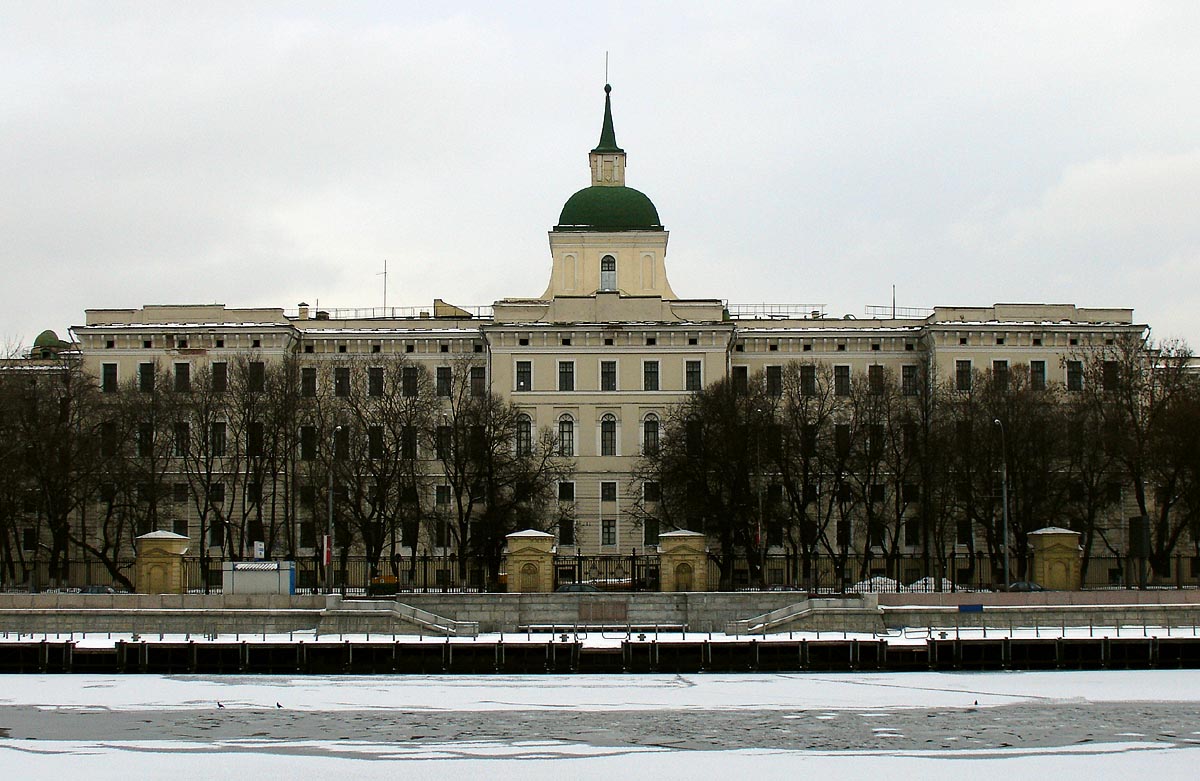- Karl Blank
Infobox Architect

caption=Moscow Orphanage
name=Karl Ivanovich Blank
nationality=Russia
birth_date=1728
birth_place=Saint Petersburg
death_date=1793
death_place=Moscow
practice_name=
significant_buildings=Baroque churches in Moscow
significant_projects=Moscow Orphanage
awards=|Karl Blank ( _ru. Карл Иванович Бланк, 1728—1793) was a Russian architect, notable as one of the last practitioners of
Baroque architecture and the firstMoscow architect to build early neoclassical buildings. His surviving, undisputed legacy consists of three baroque churches andMoscow Orphanage .Biography
Blank's ancestors were French
Huguenot refugees who settled in Germany. His grandfather, Jacob, a skilled blacksmith, migrated to Russia during the reign of Peter I. Father, already having a russified name, Ivan Yakovlevich Blank, began his career as an interpreter for the German architects inSaint Petersburg . Eventually, he became an assistant to Russian architect, Peter Yeropkin, who was closely associated with then-powerful courtier Artemy Volynsky. In June 1740, Volynsky and Yeropkin lost their heads for the alleged conspiracy againstAnna of Russia . Ivan Blank was sentenced to lifelong exile inSiberia with all his family. Karl's mother died during the long way toTobolsk . In Tobolsk, Ivan and Karl met a talented local boy,Alexander Kokorinov . In 1741, whenElizabeth of Russia came to power and pardoned all involved in Volynsky trial, Blanks were allowed to return home; they took Kokorinov with them and left for Moscow. However, Ivan Blank died soon upon his return.Karl Blank and Alexander Kokorinov joined state construction crews led by
Ivan Korobov andPyotr Obukhov . By 1749, Karl passed junior architects' exams to the panel presided byBartolomeo Rastrelli and was appointed an assistant toAlexey Yevlashev . Rastrelli supervised Blank's early career and instructed him to plan restoration and expansion drafts for the main cathedral of theNew Jerusalem Monastery . This early project never materialized, but a few years later, in 1756-1759 Blank himself took the lead in restoring New Jerusalem.His own early designs, like the completed Annenhof palace in
Lefortovo , did not survive (they burnt down in the Fire of 1812 or otherwise perished before the invention of photography). Blank's career peaked in 1760s, in the reign of Catherine II. He successfully managed the architectural part of Catherine's coronation in Moscow; the new empress commissioned him to build church of St. Catherine inZamoskvorechye . Despite subsequent fires and rebuilds, original dome of St. Catherine's still stands in Bolshaya Ordynka Street. Blank became a house architect for Ivan Vorontsov, and built two extant churches on Vorontsov's lands (one in Moscow, one in his country estate). The fourth extant church stands near Yauza Gates; two other Moscow churches were demolished in 1930s. Some researchers also give him full credit for the Trinity church in present-day Zheleznodorozhny.In 1764-1781 Blank built his largest project,
Moscow Orphanage , designed to house 8,000 resident children and staff. Only two thirds of his original plan were completed; the eastern wing was added only in 1940s. The Orphanage is believed to be Moscow's first neoclassical building, and is surely the earliest "extant" example of the style, retaining most of original exterior. The Orphanage earned him a reputation of a manager who could handle the largest projects of his time; at the same time its austere looks scared off the customers. Soon after acquiring theKremlin Senate commission in 1775, Blank was stripped of the job (the Senate was redesigned and completed byMatvey Kazakov ); his third large work for the state, Catherine's Institute inMeshchansky District of Moscow, burnt down in 1812.In 1780-s, Blank quit independent construction management and became a consultant in landscaping and interior design; his advise was sought after by the wealthiest nobles. Notably, he consulted count Pyotr Sheremetyev on
Kuskovo palace project, and personally designed the Hermitage and Dutch house pavilions.Blank had five children; among his descendents are Nikolay Basargin, a convicted
decembrist , and notable geographerPyotr Semenov-Tyan-Shansky .References
* Russian: [http://pokrovka.narod.ru/Sources/zm/Blank/Blank.htm Biography]
* Russian: [http://www.zheldor-city.ru/education/caltural/church.php Disputed design: Trinity church in Zheleznodorozhny]
Wikimedia Foundation. 2010.
